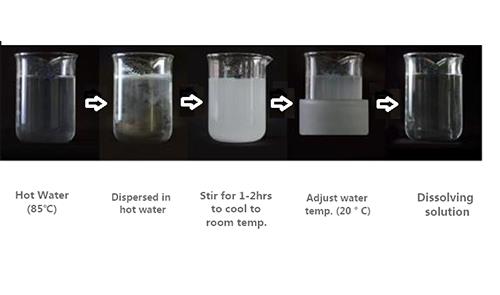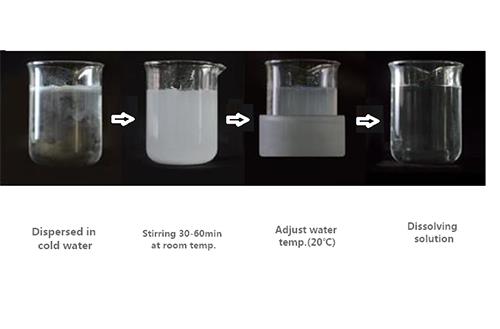Aug. 08, 2022
HPMC can be divided into instant type (surface treatment) and hot-melt type (non-surface treatment). Instant products disperse quickly in cold water and disappear into the water. The liquid has no viscosity at this time because HPMC is just dispersed in water, there is no real dissolution. After about 2 minutes, the viscosity of the liquid gradually increased to form a clear viscous gel. Hot-melt type, agglomerates in cold water, but disperses quickly in hot water, disappears in hot water, until the temperature drops to a certain temperature, the viscosity slowly appears until it forms a transparent viscous colloid.
The reason for agglomeration in cold water is that the outer layer of cellulose powder immediately becomes viscous and thickens into a transparent colloid when exposed to cold water. In practical application, it is not necessary to dissolve hot melt products with hot water, because putty powder or mortar is powder. After dry blending, the cellulose is separated from other materials. Immediately becomes sticky in contact with water and does not clump.
The hot melt type can only be used for putty powder and mortar. In liquid glues and paints, caking occurs. It can be used in a wide range of instant (surface preparation), putty powders and mortars, as well as liquid glues and coatings. There are no contraindications. However, the water retention and stability of the instant type (surface treated) cannot be compared with the hot melt type (non-surface treated).
Dissolution method of hot melt (non-surface treatment) HPMC
If hot melt (non-surface treated) HPMC is added directly to water, caking will occur before dissolution. However, dissolving in this way is very slow and difficult. Here we recommend three dissolution methods for end users based on different applications:

Non-surface treated HPMC
1. Hot water dissolving method: Since HPMC is insoluble in hot water, the initial HPMC can be uniformly dispersed in hot water, and dissolved rapidly after cooling. Two typical methods are as follows:
Add hot water (85°C) to the container. Slowly add hydroxypropyl methyl cellulose, stir slowly, HPMC floats on the water surface, gradually form a slurry, stir and cool the slurry.
Add 1/3 or 2/3 of the required amount of hot water (85°C) to the container, gradually add HPMC to the hot water, and keep stirring. Cold or ice water is then added to the hot grout to achieve the desired level. Continue stirring to cool the mixture.
2. Powder mixing method: Mix HPMC powder with a large amount of other powdery substances, stir evenly with a mixer, and then add water to dissolve. At this point, HPMC can dissolve without clumping because there is only a little HPMC in each tiny little corner. The powder dissolves immediately upon contact with water. – This method is used by putty powder and mortar manufacturers.
3. Organic solvent moisturizing and dissolving method: HPMC is pre-dispersed or wetted with organic solvents such as ethanol, ethylene glycol, or oil, and then dissolved in water, HPMC is easy to dissolve.
Dissolving method of instant type (surface treatment) HPMC
Surface treatment powders have been specially developed to prevent caking in wet mix applications such as paint and emulsion applications. To prepare the solution from the surface-treated powder, place the powder directly into cold water. A fully developed solution of suitable viscosity is prepared by stirring the solution over time.
Note: The instant type (surface treatment) HPMC dissolves quickly. After adding ammonia water or alkaline water to adjust the pH value to 8-10, a solution is formed, which can be quickly dissolved.

Surface treated HPMC
In short, for different types of products, the correct method can be fully dissolved. If lumps appear during the dissolution process, it is due to insufficient stirring or adding the regular model directly to cold water. At this point, it should be stirred quickly. In addition, if bubbles are formed when dissolving, they can be left to stand or an antifoaming agent can be added.
Welcome to inquire
Whatsapp: 008617736916366
Email: info@hpmc.com.cn
www.hpmc.com/
Shijiazhuang Henggu Jianxin Cellulose Co., Ltd.
Chemical Industrial Park, Xinji City, Hebei Province, China Post Code: 052360
Copyright 2023 Shijiazhuang Henggu Jianxin Cellulose Co., Ltd. All Rights Reserved